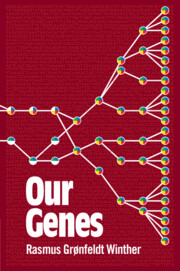Book contents
- Our Genes
- Frontispiece
- Our Genes
- Copyright page
- Dedication
- Contents
- Preface
- 1 Introduction
- 2 Origins and Histories
- 3 The Mind, the Lab, and the Field: Three Kinds of Populations
- 4 Metrics and Measures
- 5 Models and Methodologies
- 6 Six Patterns of Human Genomic Variation
- 7 Natural Selection
- 8 Intelligence, Female Orgasm, and Future Discovery
- 9 Is Race Real?
- 10 The Conscious Universe: Genes in Complex Systems
- References
- Index
- Plate Section (PDF Only)
2 - Origins and Histories
Published online by Cambridge University Press: 14 December 2022
- Our Genes
- Frontispiece
- Our Genes
- Copyright page
- Dedication
- Contents
- Preface
- 1 Introduction
- 2 Origins and Histories
- 3 The Mind, the Lab, and the Field: Three Kinds of Populations
- 4 Metrics and Measures
- 5 Models and Methodologies
- 6 Six Patterns of Human Genomic Variation
- 7 Natural Selection
- 8 Intelligence, Female Orgasm, and Future Discovery
- 9 Is Race Real?
- 10 The Conscious Universe: Genes in Complex Systems
- References
- Index
- Plate Section (PDF Only)
Summary
Modern human evolutionary genomics applies natural scientific knowledge to address ancient and fundamental Why? questions, enabling us to deepen our philosophical reflection on identity and futurity. But to understand contemporary human evolutionary genomics, we must comprehend the field’s explicit and implicit connections to its origins and early development. By delving into the basic theoretical outline and historical sources of human evolutionary genomics, we become more familiar with the layered and fractal history of Homo sapiens.
- Type
- Chapter
- Information
- Our GenesA Philosophical Perspective on Human Evolutionary Genomics, pp. 18 - 71Publisher: Cambridge University PressPrint publication year: 2022

